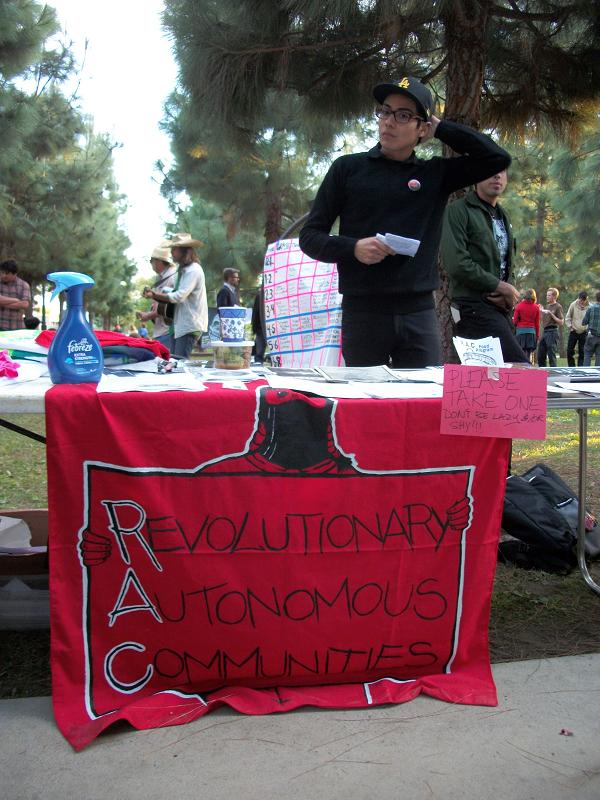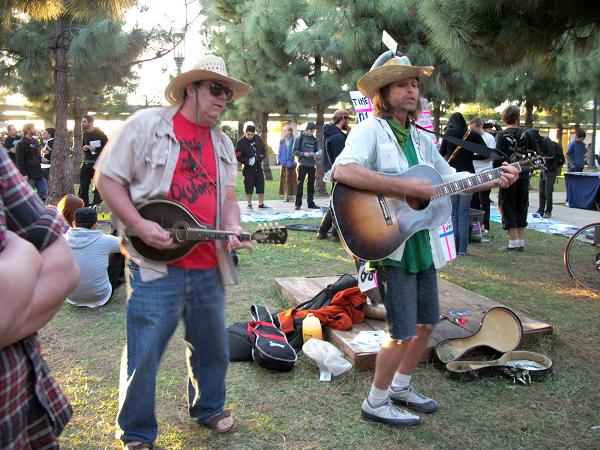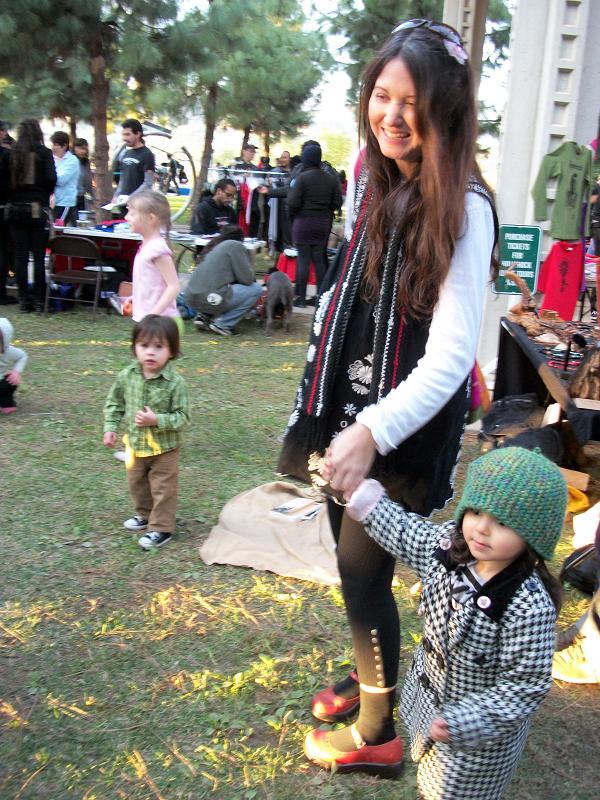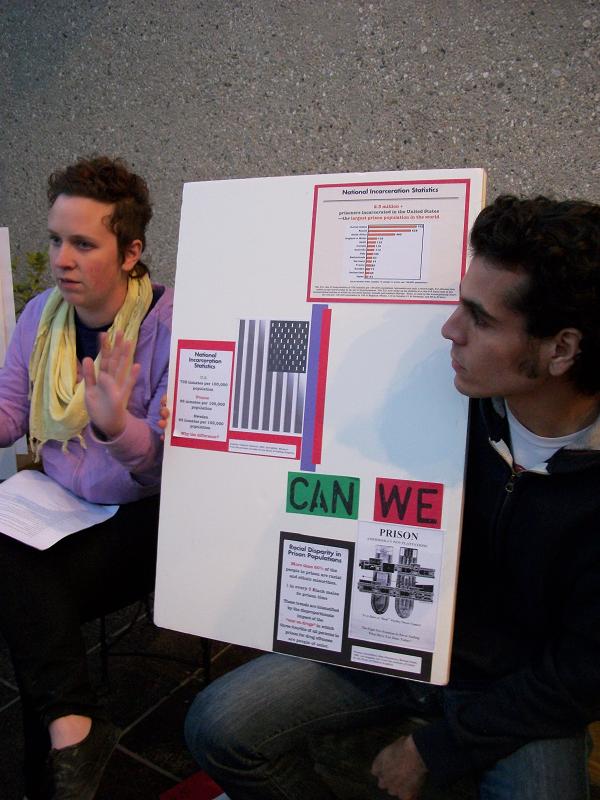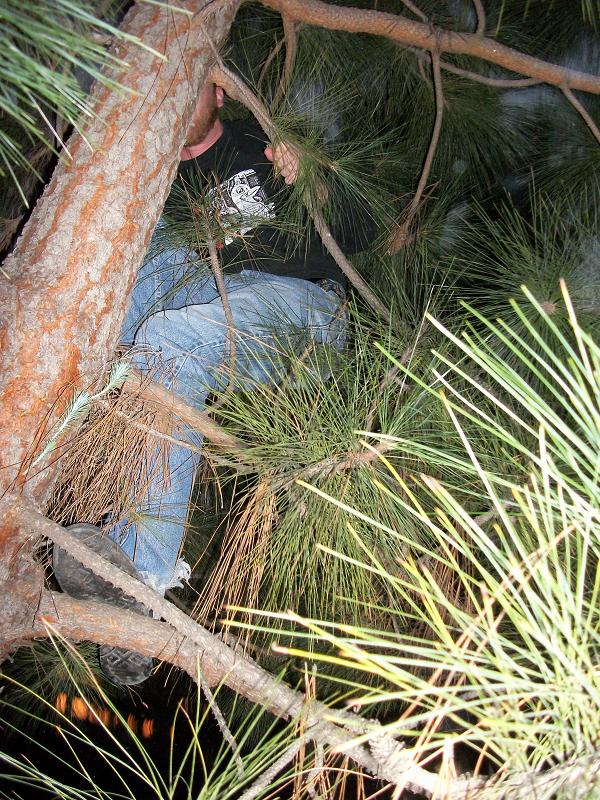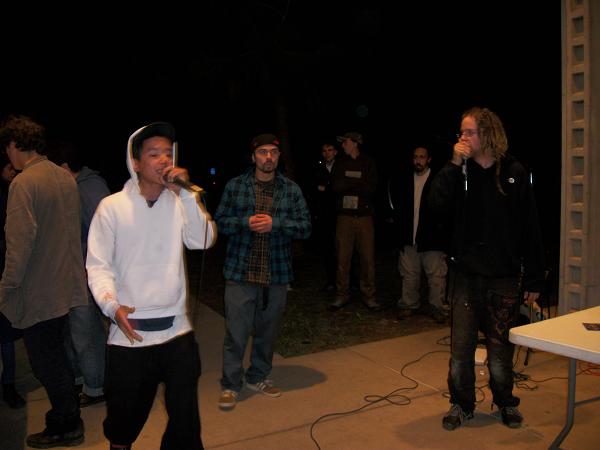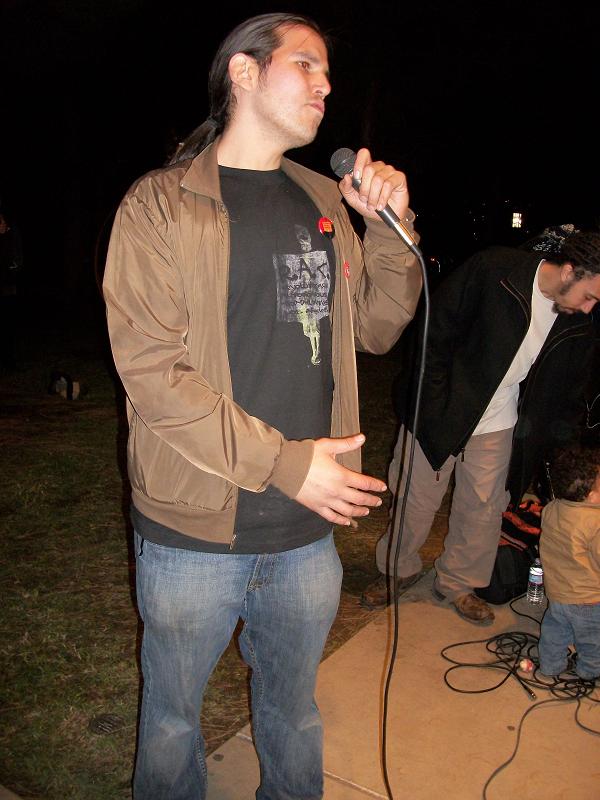Preparations began months ago, when members of the collective that organized
last year's bookfair at the
Southern California Library began holding meetings and seeking the input of other members of the community. The collective grew, and arrangements were made to hold this year's fair at the
Barnsdall Art Park, a hilltop park with such amenities as a theater, an art gallery, and a grassy area with a sculpture garden. Potential speakers were discussed and contacted. A call was issued for workshop proposals, and applications came flooding in. Community events, such as film screenings and concerts were held to raise funds and awareness about the bookfair and about anarchism in general. At long last, the day arrived.
Rainy weather throughout the week alleviated worries about longstanding water scarcity issues drought to some extent, but raised concerns about the realization of the bookfair. Fortunately, however, Sunday morning saw crystalline sunlight and azure skies, a positive sign for a productive day.
Vendors and organizers started arriving at about nine, setting up tables, posting signs, plugging in extension cords, and tying up logistical loose ends. The dancers of Danza Azteca Cuauhtémoc began donning their headdresses and anklets in preparation for the opening ceremony. And the people started arriving: community activists, punk rockers, vegans, students, artists, parents, media activists, attorneys, indigenous people, travelers, and anarchists of all stripes.
The scent of copal filled the air as
Danza Cuauhtémoc formally initiated the day's events with a ceremony traditionally associated with the planting of seeds, in hopes that the seeds of revolutionary consciousness would take root in the community. Thanks was given for the rain, and homage was paid to the indigenous caretakers of the land upon which we stood. Forgiveness was asked from the plants and animals for the human violations of their lives and homes. Finally, we were asked to share in the pain of the migrants who suffer and die as they brave borders, violence, and the elements in their quest for the dignity that should be guaranteed to us all. "These people are just like the hummingbirds, or the deer. They move also for economic reasons," intoned Judith, a leader among the dancers. "So we're no different."
Upon the conclusion of the ceremony, the crowd of spectators began milling about, some eager to attend the first workshops, others looking for food, while others began browsing the merchandise.
The first round of workshops included a talk on
dual power and modern anarchism by Harjit and Adam W., a discussion on the German Autonomen movement, a pre-cursor of the black bloc, led by Raoul, and a presentation on anarchism and urban planning by Olympia, an urban planner. In the video room, the
Revolutionary Autonomous Communities film
We're Still Here, We Never Left, a documentary on the police attack on May Day protesters in MacArthur Park, was screened.
At the talk on dual power, to which other attendees contributed greatly, Harjit began by positing that, while anarchists ask the general population to abandon capitalism, we lack the infrastructure that would allow people to make that leap. Tom Wetzel of the Workers Solidarity Alliance went on to debunk some of the myths surrounding anarchist positions on power. "One of the weaknesses of anarchism historically was there was a lot of confusion about power. People say we're against power, but actually, the mass of people, the working class people, can't liberate itself without actually creating new structures of power to run things. To run the society, that's power. And I think the idea of popular power, power that's based on 'we're all equals,' self-managed kind of power, I mean, that's how I think of the replacement for the state and the corporations, and so on. But in terms of developping power now, it might be useful to distinguish between, like, social power that people build through movements that are engaged in confrontations, like shutting down workplaces. That means ordinary people are actually exercising power, some power. But it's power that comes about through struggle, through confrontation with the people that have power in this system. But if you're just running a collective, like of food distribution, that's not really power, that's collectively managing a resource. But I think that's different from social power. And the point you said about transition to the new society, we have to have things there that can make that transition, historically, that was part of the whole reason for syndicalism--you develop a working-class movement where we have in all the various workplaces, we have workers organized in revolutionary, self-managed workplace organizations or unions, so that in a transitional situation, they can take over the running of those workplaces and guarantee that we still have food and transportation and public utilities and so on."
During the next hour, the first of the panel discussions was held. Authors of anarchist texts, including Andrej Grubačić, the author of
Wobblies and Zapatistas, Cindy Milstein, who penned the forthcoming
Anarchist Aspirations, Mitchell Cowen Verter, editor of the Ricardo Flores-Magón reader
Dreams of Freedom, and Gary Phillips, who produced
The Jook, who shared insights about their works.
Meanwhile, a
discussion was held about anti-fascist organizing in the Southern California area, which touched on the topics of
recent Nazi activiy in the Inland Empire and current efforts to oppose the American Third Position Party, as well as issues of race within the antifascist movement and the historic anarchist opposition to fascism.
In the video room, a slide show of anarchist-themed posters from the holdings of the
Center for the Study of Political Graphics was presented.
The next hour featured a panel presentation about
political prisoners.
Ojore Lutalo and Sherman Austin, both former political prisoners, shared the stage with Mapache, the moderator, Matt, an organizer with the
Los Angeles chapter of the Anarchist Black Cross Federation, and Ben, who was discussing political prisoners in Latin America.
Before beginning the discussion, Mapache asked the audience to entertain a few questions as they listened. "Specifically for the white audience, do you view yourself as oppressed?" He based his definition of oppression on that of Julis Lester in the text
Revolutionary Notes, copies of which were circulated amongst the audience. "Second question is for the entire audience, do you consider yourself a revolutionary or progressive?" Another pamphlet was distributed on this topic. "Third question, do you view drugs as revolutionary or counterrevolutionary?"
Ojore began: "I became politically active in the early 1970s after living a life of drugs and street crime. I went to prison, and I met the late New Afrikan anarchist Kuwasi Balagoon and other POW political prisoners. It was at least seven years later, then I joined the armed struggle, underground. I was captured in 1975 for an armed bank expropriation, engaging the police in a gun battle. Then I served 28 years in Trenton State Prison for my political activity, and I was released August 26th, 2009 by way of court order."
He continued with an update on the BLA: "Currently, the BLA is dormant, due to activities of COINTELPRO--currently Homeland Security. But you still have BLA prisoners in the prisons who aren't being supported who are in dire need of your support. For instance, Sekou Odinga just served 28 years in the federal system. He was transferred to New York State prison system several months ago. He is currently serving 20 years to life. His last hope for release is based on a pending action he has in court. He's in the process of trying to raise $5,000 to retain an attorney to assist him in his legal battle." He also discussed
Sundiata Acoli, who will face the parole board next month,
Herman Bell, and their need for support.
Sherman Austin, jailed for two years for being the webmaster of the revolutionary website
raisethefist.com spoke next, discussing the tactics that were used against him. "It's kinda funny that it's the anniversary [of the FBI raid on his house] and it's the anarchist bookfair. I don't know if that was intentional, or just kind of happened to be. The type of tactics that were used were wiretaps, they monitored instant messenger conversations, e-mails, I had cars parked in front of my house, I was followed." He went on to clarify some of the common misconceptions about his case and the USA PATRIOT Act. "After all this went down, there was a lot of talk about how our civil liberties were being eroded because of the USA PATRIOT Act, but the fact of the matter is that all this stuff had been going on a lot longer before my case even started. The PATRIOT Act just put it out there and said, the government said, and the FBI said, 'We're just gonna do it, but we're not gonna do it under the cover anymore, we're not gonna do it under the rug, we're gonna do it out in front of everyone's face and there's nothing anyone can do about it.'"
Matt then spoke on the difference between oppressions faced by working-class whites and communities of color, quoting Stokely Carmichael: "Whites are exploited, but other communities are colonized." In this sense, it is incumbent upon whites in the movement to realize, as he put it, "this is our movement as well." Nonetheless, he pointed out, it is important to recognize how easy it is for whites to make use of their white skin privilege in order to avoid the consequences of their involvement in revolutionary politics, whereas people of color have no such recourse.
Sherman elaborated on the situation, explaining that the FBI's interest in him was the result of a young white man who failed to take responsibility for placing bomb-making instructions on a website that was hosted on Sherman's server. In addition, people involved in the movement that had bruited about the need for revolution were the first to become informants once state pressure was brought to bear upon them. "When we turn our backs on each other, that destroys our movement," he summarized.
Ojore shared that faced a similar situation in 1982, when a former Black Panther with a drug problem became an informant, which led to Ojore's apprehension by the FBI and his subsequent incarceration. He continued with an analysis of drug use, concluding that it is a counterrevolutionary form of self-oppression and that revolutionaries should not use drugs, and those that do, should seek the help of revolutionary substance abuse programs.
Mapache then challenged the audience, who had been pondering the question of the distinction between progressivism and revolution, to support political prisoners, since they are the ones who have taken steps that others were unwilling or unable to take and are now suffering for it. Matt shared the story of Thomas Warner, an incarcerated Black Panther who committed suicide in prison. "Part of the reason why he committed suicide was because of the fact that he didn't have support. He felt alone. This is somebody that was a political prisoner, that every single political prisoner support organization had on their list, but not a single one of them knew who this guy was. We found this out two years later after he died. Two years later. And it makes me think that if there were more people out there doing political prisoner work, maybe one more letter would've gotten to him, and it might've changed his mindset just a little bit."
Ben then shared some highlights from a report on political prisoners in Latin America provided by
Rodolfo Montes de Oca, a Venezuelan comrade of the LA bookfair collective and a member of the editorial collective of
El Libertario. For one, Latin America is the region of the world with the greatest number of anarchists assassinated by both state and para-state actors. There has also been an upsurge in anarchist activity--primarily to denounce the pseudo-socialism espoused by the left-wing governments currently dominating the continent, which has faced severe repression and resulted in numerous political prisoners. Among them are Diego Sebastián Petrissans, Leandro Sebastián Morel, Cristián Cancino, Marcelo Villarroel, Freddy Fuentevilla, Axel Osorio, Asel Luzárraga, Matías Castro, Pablo Carvajal, Víctor Hernández Govea, Emmanuel Hernández Hernández, Abraham López Martínez, Fermín Gómez Trejo, and Sabino Romero, all of whom are in need of solidarity and support.
While the political prisoners panel was being conducted,
Kaley, a member of the Anarcha-feminist collective
Anarcha-LA and the coordinator of childcare at the bookfair, gave a workshop on radical parenting, and elsewhere, a film on abuses of immigrant workers in the sheep industry was screened. On the balcony, Tom Wetzel and other members of the
Workers Solidarity Alliance introduced curious attendees to their organization. Outside Barnsdall's Junior Arts Center, a talk on veganism and health was attended by more than thirty people. "I got to talk to an anarchist vegan dietician who let me know the perks of the diet, and making sure that I'm eating correctly and I'm not gonna end up doing harm to my body, and that was really cool because he answered a lot of my questions," said
Francisco, a student from Santiago, Chile who recently unenrolled due to the high cost of tuition.
The next hour saw a packed theater for the
panel on indigenous resistance. Simultaneously, Cindy Milstein shared space with Andrew, a member of the
Institute for Anarchist Studies and anarchist archives, a film on the criminalization of the participants in the Oakland rebellion was screened, and there was a chat about anarchists and radicals in the health professions.
The panel was made up of Professor Andrea Smith from the Cherokee Nation, Alex Soto from the Tohono O'odham Nation, Mark and Jamie, traditionalists from the Diné Nation, and Klee Benally, also of the Diné Nation. Topics included the centrality of indigenous rights to any struggle for liberation, the border wall, cultural genocide, the
Táala Hooghan infoshop.
Outside, Andrew spoke on the importance of anarchist archives, showing examples of materials from the
Anarchy Archives in Claremont. He emphasized the need to preserve our own history and to support the work of archivists the world over who conserve the evidence of our struggle. His talk dovetailed neatly into Cindy on the
Institute for Anarchist Studies. She encouraged those present to apply for the grants that the Institute issues to writers and translators.
The film concerned the rebellion that took place in response to the New Year's Eve police murder of 22-year-old
Oscar Grant. The trial of Grant's murderer, Johannes Mehserle, has been moved to Los Angeles and local media activists are closely following the trial in order to facilitate the achievement of justice for Grant and his family.
The final panel, which was on worker and student occupations, took place during the next hour. Sirena spoke about workers' occupations in Argentina, while Chris, Eowyn, Gifford, and Paul took part in the discussion, most of which centered around recent efforts to oppose budget cuts in the California public education systems and to reclaim student spaces.
Outside, Ned led a talk on radical queer politics, which deconstructed the "-isms" experienced by queer and trans people, while Toi and Rebecca led a workshop on autonomous birthing.
The last set of workshops included the
Earth First! roadshow, a screening of a film on strikes and occupations, a workshop on prison abolition led by the Los Angeles chapter of
Critical Resistance, and a look at radical feminist anatomy by
Pati, a doula.
Throughout the day, spontaneous conversations and impromptu workshops were held. At a makeshift bicycle garage, lessons on repair and maintenance were given.
Illogic, a Canadian hip-hop artist from the raised fist collective and partner in rhyme of
Testament, gave a self-defense workshop. The Long Beach chapter of Food not Bombs served food provided by the Los Angeles chapter, and when that ran out, the guerrilla chapter showed up to feed those of us who were still hungry or had not gotten any of the vegan sopes being sold by
Mariana and her family. An
intrepid environmentalist, not to be let down by the absence of tree-climbing promoted on the flyer, decided to simply take matters into his own hands. A graf artist set up a canvas and did live painting. At some point, goods donated by vendors and comrades were
raffled off, elating the prizewinners. Rebel folk musicians inspired children and their parents to dance. And everywhere, people chatted, got to know one another, traded contact info, and of course, shopped.
As the events began dying down, a microphone was set up. The
Outspoken Wordsmiths, another Canadian hip-hop group who is touring with Testament and Illogic to promote
resistance to the 2010 Olympic Games, which are to be held on the occupied Salishan territories known today as British Columbia, performed, and then beatboxed under the freestylings of various members of the audience. After the performance, members of the
bookfair collective gave thanks to the attendees, vendors, and guests, particularly those who came great distances, and opened the microphone up for announcements. These included messages regarding RAC's programs, the upcoming March for Zapata in East Los Angeles, and an afterparty/concert held at the Tribal Café. Finally, a request was made for clean-up support. Everyone did their share, lent a hand, and packed up the tables in no time at all.
If we can reorganize the society in the same way we organized the bookfair, then we can surely build a new world from the ashes of the old.
__________________________________
The author would like to thank the members of the Los Angeles Anarchist Bookfair Collective for their support in the composition of this article.http://la.indymedia.org/news/2010/01/234487.phpAcciones + Conversaciones + Intersecciones 2010: Segunda Anual Feria del Libro Anarquista
by Rockero Thursday, Jan. 28, 2010 at 12:10 AM
rockero420@yahoo.com
Domingo, 24 Enero 2010
HOLLYWOOD - Por el segundo año consecutivo, anarquistas del área de Los Ángeles realizaron una feria de libros, la cual que, además de propiciar intercambios entre vendedores y lectores ávaros para la literatura, también posibilitó todo un espectro de pláticas en panel, talleres, y de suma importancia, interacciones de calidad entre compañerxs activistas del movimiento libertario.
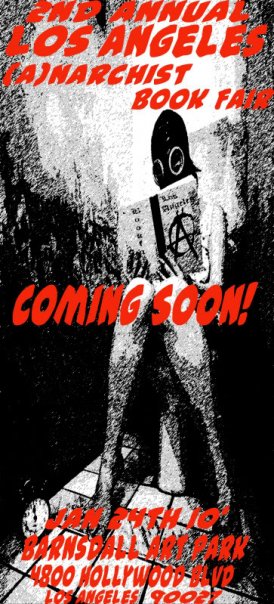
Los preparativos se iniciaron hace unos meses, cuando integrantes del colectivo coordinador de la
feria del libro anarquista del año pasado, que tuvo lugar en la
Librería del Sur de California, empezó a reunir y pedir las aportaciones y sugerencias de otros sectores de la comunidad. El colectivo comenzó a crecer, y se hicieron arreglos para realizar la feria del año en curso en el
Parque de Arte Barnsdall, ubicado en la cima de un cerro y que cuenta con tales lujos como un teatro, una galería de arte, y un jardín de esculturas en una plaza de pasto. El colectivo habló de e hizo contacto con posibles oradores. Se lanzó un llamado para propuestas para talleres, y las solicitudes empezaron a llegar en multitudes. Eventos comunitarios como muestras cinematográficas y conciertos fueron planificados con el fin de propagandizar la feria y el anarquismo, al igual que para recaudar fondos. Después de tanto preparar, el día clave por fin llegó.
Una semana entera de lluvias fuertes incitó preocupaciones referente a la realización de la feria del libro, no obstante su alivio a la carencia regional de aguas. Afortunadamente, el firmamento amaneció cristalino y despejado de toda nube, un buen agüero que prefiguraba un día productivo.
Por las nueve empezaron a llegar los organizadores y vendedores, armando mesas, poniendo rótulos, enchufando cables, y finalizando detalles logísticos. Los danzantes de la tropa Danza Azteca Cuauhtémoc llegaron y se pusieron a ponerse los tocados de pluma y tobilleras de capullo, alistándose para la ceremonia inicial. Y empezó a llegar la gente: activistas comunitarios, punkeros, veganos, estudiantes, artistas, madres y padres de familias, activistas mediáticos, abogados, indígenas, viajeros, y anarquistas de toda variedad.
La danza formalizó el comienzo del evento con una danza tradicionalmente asociada con la siembra de semillas, con la esperanza que se germinara una conciencia revolucionaria entre el pueblo. Al danzar, el aire se llenó del aroma de copal. Lxs danzantes dieron gracias por las lluvias recientes, y luego hicieron homenaje a lxs conservadorxs de la tierra, el pueblo indígena. Luego pidieron el perdón de los animales y las plantas por la violación humana de sus vidas y hogares. Finalmente, nos pidieron que compartieramos del sufrimiento de los migrantes que mueren al enfrentar fronteras, violencia, y el intemperie en su búsqueda para la dignidad que nos debería ser garantizada a todxs. "Estas personas son como los colibríes, o como los venados. También se trasladan por motivos económicos," precisó Judith, líder entre lxs danzantes. "Entonces, nosotros no nos diferenciamos tanto de ellos."
Se concluyó la ceremonia, y el públicó empezó a dispersarse para asistir los primeros talleres, buscar comida, y mercar.
La primera ronda de talleres incluyó una plática sobre el
doble poder y el anarquismo moderno por Harjit y Adam W., una charla sobre el Autonomen Alemán, un movimiento que precedió el brote del Bloque Negro, liderado por Raoul, y una presentación sobre el anarquismo y la planificación urbana por Olympia. En el salón de videos, las
Comunidades Revolucionarias Autónomas mostraron su película
Todavía Estamos Aquí, Nunca Nos Fuimos, un documental sobre el ataque policial contra manifestantes en el Parque MacArthur el primero de mayo, 2007.
El la plática sobre el doble poder, a la cual el público contribuyó bastante, Harjit empezó con la idea que, aunque los anarquistas piden que el pueblo abandone el capitalismo, nos hace falta la infraestructura que permitiría que el pueblo tome ese gran paso. En el proceder, Tom Wetzel de la Alianza Solidaridad Obrera aclaró uno de los mitos rodeante el anarquismo, el de la postura anarquista hacia el poder. "Históricamente, una de las debilidades del anarquismo ha sido que ha habido mucha ambigüedad en torno al poder. Hay lxs que dicen que nos oponemos al poder, pero la verdad es que la mayoría de la gente, la clase obrera, no puede liberarse sin crear de nuevo estructuras de poder para gestionar las cosas. Manejar la sociedad, ése es el poder. Y pienso que la idea del poder popular, un poder que se basa sobre 'somos iguales,' un poder autogestionado, digo, así es como conceptualizo una sustitución para el estado y las corporaciones, etcétera. Pero en cuanto al desarrollo actual del poder, vale distinguir entre, por ejemplo, poder social que la gente construye a través de movimientos que participan en confrontaciones, como el cerrar de lugares de trabajo. O sea que el pueblo común está ejerciendo el poder, hasta cierto grado. Pero es un poder que se logra mediante la lucha, por enfrentarse a lxs que tienen el poder dentro del sistema. Pero si estás manejando un colectivo, digamos una distribución alimenticia, eso no es el poder verídico, eso es manejar colectivamente un recurso. Es diferente del poder social. Lo que decías de una transición a la nueva sociedad, que tenemos que tener cosas para hacer esa transición, históricamente, eso fue parte de la razón para el sindicalismo--se desarrolla un movimiento de clase obrera en el que tenemos en todos los talleres obrerxs organizadxs en sindicatos revolucionarios y autogestionantes para que éstos se encarguen de manejar los talleres y asegurar que tengamos comida, transporte, servicios públicos, etcétera."
Durante la siguiente hora, la primera discusión de pánel tuvo lugar. Autores de textos anarquistas, incluyendo a Andrej Grubačić, autor de
Wobblies y Zapatistas, Cindy Milstein, quien escribió
Anarchist Aspirations (a estrenarse próximamente), Mitchell Cowen Verter, editor de la copilación magonista
Dreams of Freedom, y Gary Philliips, compositor de
The Jook, compartieron reflexiones sobre sus obras.
Mientras, se llevó a cabo una
charla sobre esfuerzos antifascitas en la región surcaliforniana que tocó los temas de la
reciente actividad neonazista en el interior del Sur de California, el tema de la raza dentro del movimiento antifascista, y gestos actuales en contra del nuevo Partido Americano Tercera Posición. También abarcó antecedentes históricos de oposición anarquista al fascismo.
En el salón de videos, una exposición de diapositivas de afiches anarquistas de la colección del
Centro para el Estudio de la Gráfica Política fue presentada.
Lxs próximxs panelistas trataron el tema de
presos políticos.
Ojore Lutalo y Sherman Austin, ambos ex-presos políticos, compartieron el escenario con Mapache, el facilitador, Matt, un organizador con el comité de Los Ángeles de la
Federación Cruz Negra Anarquista, y Benjamín, quien habló de los presos políticos en Latinoamérica.
Antes de empezar la plática, Mapache pidió al público que consideraran ciertas preguntas al escuchar. "En particular para lxs de herencia europea, ¿te consideras oprimidx?" Basó su definición de opresión sobre la de Julius Lester en su obra
Revolutionary Notes, copias de la cual fueron distribuídas entre la audiencia. "Segunda pregunta para el público en general, ¿te consideras revolucionarix o progresista?" Se repartió otro folleto tocante este tema. "Tercera pregunta, ¿consideras qu la droga es revolucionaria o contrarrevolucionaria?"
Empezó
Ojore: "Fui politicizado en los tempranos setentas después de una vida de drogas y delincuencia callejera. Fui encarcelado, y conocí al fallecido anarquista Nuevoafrikano Kuwasi Balagoon y otros presos políticos de guerra. Unos siete años después me integré a la lucha armada clandestina. Me llevaron preso en 1975 por una expropriación bancaria armada, batallando a tiros con la policía. Luego de una condena de 28 años en el Penal Estatal de Trenton por mi actividad política, fui puesto en libertad por orden judicial el 26 de agosto, 2009."
Continuó con actualidades sobre el Ejército Libertador Negro: "Actualmente, el ELN está inactivo debido a las actividades de COINTELPRO, actualmente Seguridad Interna. Pero hay todavía presos del ELN en las prisiones que no reciben apoyo y necesitan urgentemente de tu apoyo. Por ejemplo, Sekou Odinga acaba de cumplir 28 años en el sistema federal y fue trasladado el sistema carcelario del estado de Nueva York hace unos meses. Su sentencia es de 20 años a vida. Su última esperanza para la libertad depende de una audiencia pendiente. Está en el proceso de recaudar $5.000 para contratar a un abogado para asesorarlo en su batalla legal." También habló de
Sundiata Acoli, quien tendrá audiencia ante la mesa directiva de fianza el mes entrante,
Herman Bell, y la necesidad que ellos tienen de apoyo.
Sherman Austin, encarcelado por dos años por manejar el sitio de internet
raisethefist.com, fue el próximo en hablar de las tácticas que fueron utilizadas en su contra. "Cómo es curioso que es el aniversario [del cateo del FBI de su casa] y es la feria del libro anarquista. No sé si eso fue intencional o simplemente ocurrió así por casualidad. La clase de tácticas que usaron contra mí fueron pinchadas telefónicas, monitoreo de conversaciones de mensajería instantánea, correos electrónicos, estacionaron carros fuera de mi casa, me siguieron." Aclaró un malentendimiento que tienen muchos acerca del USA PATRIOT Act y su caso. "Después de que todo esto ocurrió, se hablaba mucho de cómo nos estaban repelando los derechos individuales por el PATRIOT Act, pero el hecho es que todas estas cosas ya estaban en marcha mucho más antes del caso mío. El PATRIOT Act simplemente declaraba que el gobieron y el FBI ya no iban a ocultar sus actividades sino ejercer abiertamente, y no había nada que nadie pudiera hacer en contra."
Luego habló Matt sobre la diferencia entre las opresiones que enfrentan blancxs de clase obrera y comunidades de color, citándole a Stokely Carmichael: "Los blancos son explotados, pero otras comunidades son colonizadas. En este sentido, es el deber de lxs blancxs de darse cuenta que, según el locutor, "Éste es nuestro movimiento también." Sin embargo, señaló que es importante reconocer que tan fácil es que lxs blancxs aprovechen del privilegio que les otorga el color de su piel para evitar las consecuencias de su involucramiento en la política revolucionaria, mientras que para personas de color, no existe esa posibilidad.
Explicó Sherman que el interés que tuvo en él el FBI resultó de las acciones de un joven blanco que no tomó responsabilidad por poner instrucciones para fabricar bombas en un sitio de internet mantenido en el servidor de Sherman. A ésto se suma que fueron lxs mismxs activistas que más fuertemente hablaban de revolución que luego que sintieron la presión de los aparatos estatales, se volvieron informadores. "Cuando nos damos la espalda el uno al otro, eso destruye nuestro movimiento," resumió.
Ojore compartió que él había enfrentado una situación semejante en 1982, cuando un ex-Pantera Negra con un problema de drogadicción se hizo infromador, hecho que terminó con su aprehensión en manos del FBI y su encarcelamiento consecuente. Procedió su análisis del uso de drogas, en la que concluyó que es una forma contrarrevolucionaria de auto-opresión y que lxs revolucionarixs no deben usar drogas, y los que las usan deben buscar la ayuda de programas revolucionarios de antidroga.
Luego retó Mapache al público, que había estado reflexionando sobre la distinción entre progresismo y revolución, a que apoyaran presxs políticxs, ya que son ellxs que han tomado los pasos que otrxs no pudieron tomar y ahora ya están sufriendo por lo mismo. Matt relató la historia de Thomas Warner, un Pantera Negra encarcelado que cometió suicidio en la cárcel. "Parte de la razón por qué él se suicidó fue porque él no tenía ningún apoyo. Se sentía sólo. Fue alguien que era preso político, que todas las organizaciones de apoyo a presxs políticxs tenían en sus listas, pero ninguno de ellas sabía quien era este tipo. Nosotros nos enteramos dos años despues de su muerte. Dos años después. Y me hace pensar que si hubiera más personas trabajando el teme de presxs políticxs, tal vez una carta más le habría llegado, y le podría haber cambiado un tantito su mentalidad."
De allí destacó Benjamín algunos detalles de una exposición sobre presxs latinoamericanos proporcionada por
Rodolfo Montes de Oca, un compañero venezolano del colectivo coordinador de la feria del libro e integrante del colectivo editorial de
El Libertario. Por uno, Latinoamérica viene siendo la región del mundo con la mayor cantidad de anarquistas asesinadxs por actores estatales y paraestatales. También ha habido una resurgencia de actividad anarquista--principalmente en denuncia del socialismo falso adoptado por los gobiernos izquierdistas que actualmente predominan en el continente sudamericano. Estos anarquistas han sido reprimidos cruentamente y muchos han termindo en la cárcel. Entre ellos son Diego Sebastián Petrissans, Leandro Sebastián Morel, Cristián Cancino, Marcelo Villarroel, Freddy Fuentevilla, Axel Osorio, Asel Luzárraga, Matías Castro, Pablo Carvajal, Víctor Hernández Govea, Emmanuel Hernández Hernández, Abraham López Martínez, Fermín Gómez Trejo, y Sabino Romero, todos de los cuales necesitan solidaridad y apoyo.
En lo que el pánel sobre presxs políticxs acontecía,
Kaley, integrante del colectivo anarcofeminista
Anarcha-LA y coordinadora del cuidado de niños para la feria de libros, dio un taller sobre la crianza de niños para radicales. En otro salón pasó una película sobre abusos de trabajadores inmigrantes en la industria ovejera. En el balcón, Tom Wetzel y otros miembros de la
Alianza Solidaridad Obrera presentó su organización a partícipes interesadxs. Afuera del Centro Artístico Juvenil del Parque Barnsdall, una plática sobre la salud y el veganismo fue asistida por más de 30 personas. "Logré hablar con un nutricionista anarcovegano quien me dio a saber las ventajas de la dieta y me ayudó a asegurar que estoy comiendo correctamente y que no iba a hacer daño a mi organismo, y me gustó bastante porque contestó todas mis preguntas," recalcó
Francisco, un ex-estudiante originario de Santiago de Chile ya radicado en California que tuvo que retirarse de las clases por el incremento en las colegiaturas.
Durante la próxima hora se llenó por completo el teatro para el pánel sobre la
resistancia indígena. Simultáneamente, Cindy Milstein compartió espacio con Andrew, miembro del
Instituto por los Estudios Anarquistas y archivos anarquistas. También se mostró un documental sobre la criminalización de participantes de la rebelión de Oakland y se hizo una plática sobre anarquistas dentro de las profesiones de salud.
El pánel constó de Profesora Andrea Smith de la Nación Chéroqui, Alex Soto de la Nación Tohono O'odham, Mark y Jaime, tradicionalistas de la Nación Diné, y Klee Benally, también de la Nación Diné. Temas incluyeron la centralidad de los derechos indígenas a toda lucha por liberación, el muro fronterizo entre Estados Unidos y México, genocidio cultural, y el
infoshop Táala Hooghan.
Afuera, Andrew habló de la importancia de los acervos anarquistas, mostrando ejemplos de materiales de los
Anarchy Archives de Claremont. Enfatizó la necesidad de preservar nuestra propia historia y de apoyar la labor de archivistas de todo el mundo que conservan las evidencias de nuestra lucha. Su plática se alineó bien con la de Cindy sobre el Instituto por los Estudios Anarquistas. Ella alentó a lxs que estuvieron presentes que pidieran las becas que el Instituto otorga a escritores y traductores.
La película se trató de una revuelta que transpiró como respuesta al asesinato policial de Oscar Grant, de 22 años el primero de enero del año pasado. El proceso jurídico de Johannes Mehserle, acusado del crimen, ha sido trasladado a Los Ángeles, y activistas locales están siguiendo el proceso para afirmar el anhelo popular para justicia en el caso.
El último pánel, que abordó el tema de ocupaciones de obreros y estudiantes, tomó lugar durante la próxima hora. Sirena habló de ocupaciones de obreros en Argentina, mientras que Chris, Eowyn, Gifford, y Paul participaron en la discusión que se centró sobre recientes esfuerzos para oponer recortes presupuestarios en el sistema educativo público de California y para reclamar espacios estudiantiles.
Afuera, Ned encabezó un taller sobre la política radical de la comunidad LBGT, el cual deconstruyó los "-ismos" experimentados por miembros de dicha comunidad, mientras que Toi y Rebecca dirigieron un taller sobre el parto autónomo.
La última hora de talleres incluyó la gira de
¡Tierra Primera!, la muestra de una película sobre paros y ocupaciones, un taller sobre abolición carcelaria dirigido por el comité de Los Ángeles de
Resistencia Crítica, y una mirada radical a la anatomía feminina por
Pati, una partera.
A lo largo del día, conversaciones espontáneas y talleres improvisadas se realizaron. En un taller mécanico para bicicletas, se dieron lecciones sobre reparaciones a bicicletas.
Illogic, artista canadiense de hip-hop del colectivo puño alzado y co-presentador con
Testament, dio un taller de autodefensa. El comité de Long Beach de Comida No Bombas sirvió refrigerio provisto por el comité de Los Ángeles, y cuando ése se acabó, el comité guerrillero llegó para alimentar a lxs que seguían con hambre o que no alcanzaron a comprar los sopes veganos a la venta por
Mariana y su familia. Un
ecologista audaz, no desilusionado por la falta de trepado de árboles prometido en el volante, decidió simplemente trepar un árbol solito. Un artista de grafitti armó un lienzo y se puso a pintar. Al agrado del público,
se rifó mercancía donada por vendedores y compañerxs. Músicos del folclor rebelde inspiraron a niños y sus padres a bailar. Y en todas partes, personas se platicaron, se conocieron, intercambiaron datos, y por supuesto, compraron.
Al tranquilizarse los eventos del día, se arregló un sistema de sonido. Los
Outspoken Wordsmiths, otro grupo canadiense de hip-hop de gira con Illogic y Testament para promover
resistencia a los juegos olímpicos del 2010, que se harán sobre terrenos ocupados del pueblo Salish ahora conocidos como Colombia Británica, estrenaron, y luego proveyeron un ritmo de beatbox para raperos del público. Después de la presentación,
integrantes del colectivo coordinador de la feria del libro dieron gracias a lxs asistentes, vendedores, e invitadxs, en especial a lxs que vinieron de la lejanía, y luego abrieron el micrófono para anuncios. Éstos incluyeron mensajes sobre los proyectos de las Comunidades Revolucionarias Autónomas, la anual Marcha por Zapata en el Éste de Los Ángeles, y un pos-feria concierto en el Café Tribal. Por último, se pidió manos de obra para ayudar con la limpieza del parque. Todxs aportaron, ayudaron, y de volada se guardaron las mesas.
Si se puede reorganizar la sociedad como se organizó la feria del libro, seguro que podramos construir un mundo nuevo de las cenizas del antiguo.
____________________________
Al autor le gustaría extender sus agradecimientos a lxs integrantes del colectivo coordinador de la Feria del Libro Anarquista de Los Ángeles por su colaboración en este artículo.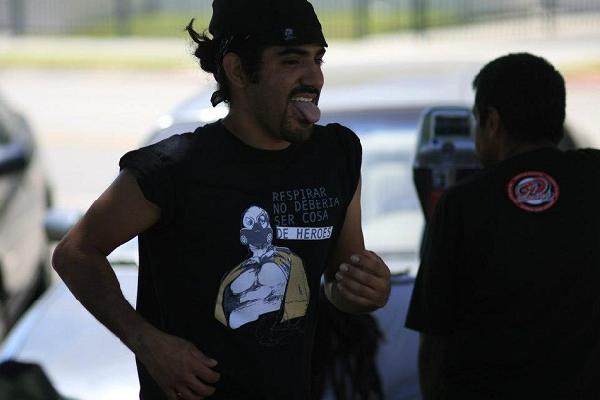
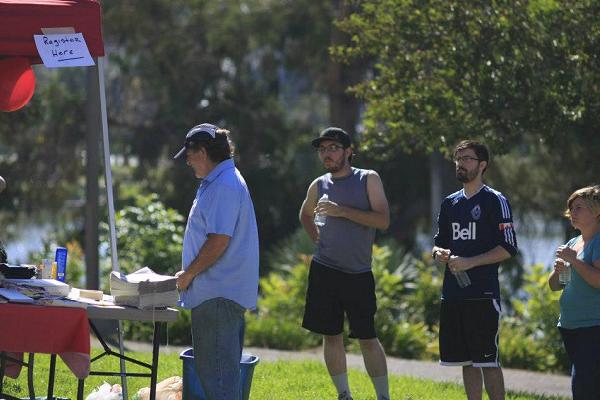

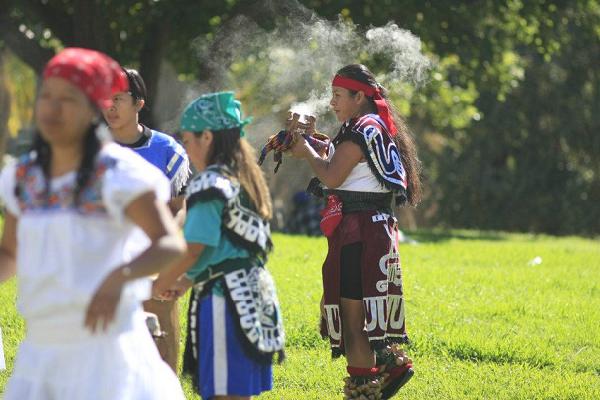
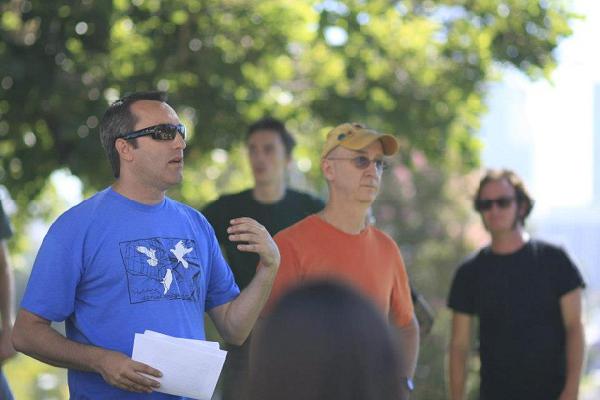
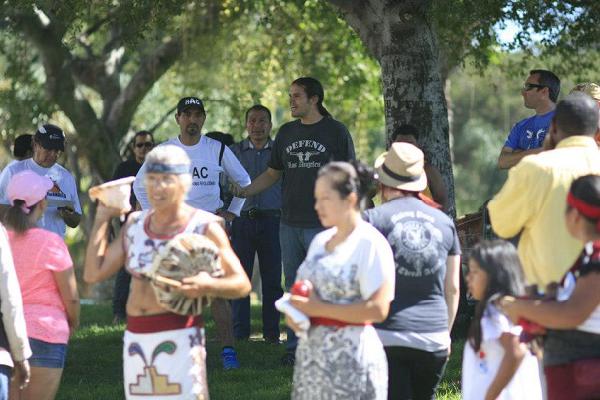
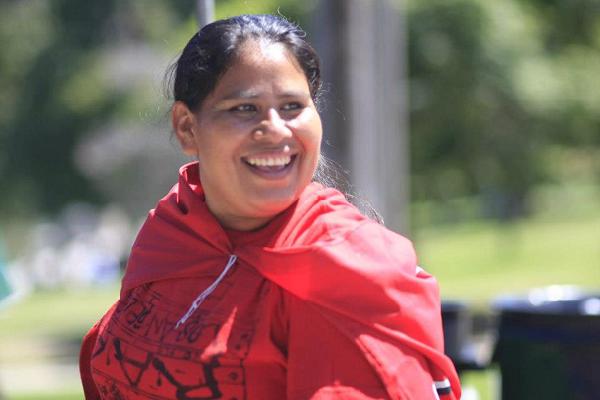
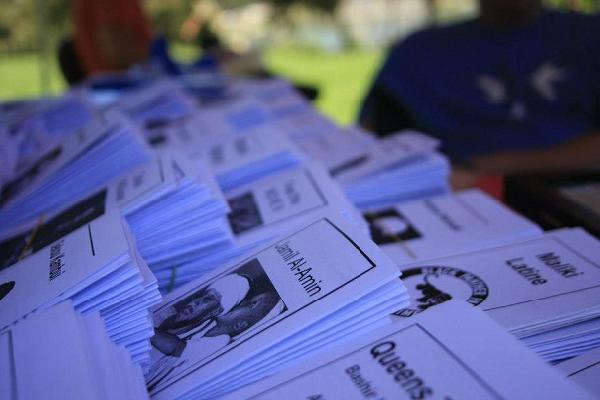



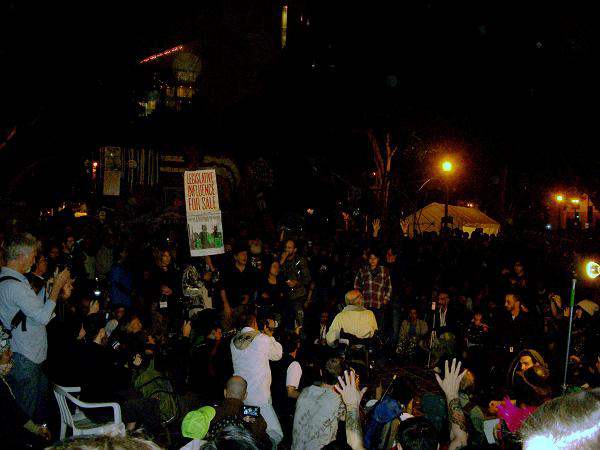
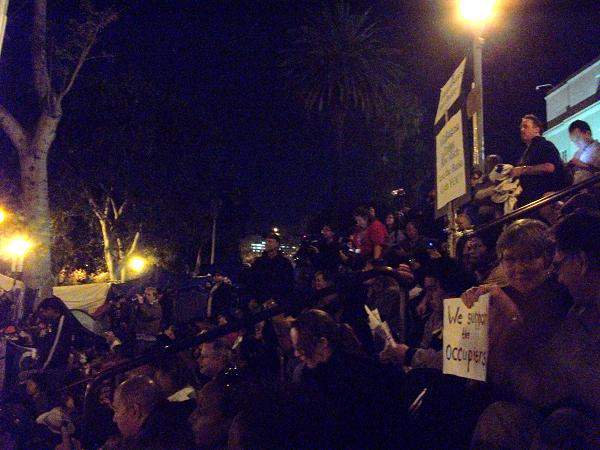
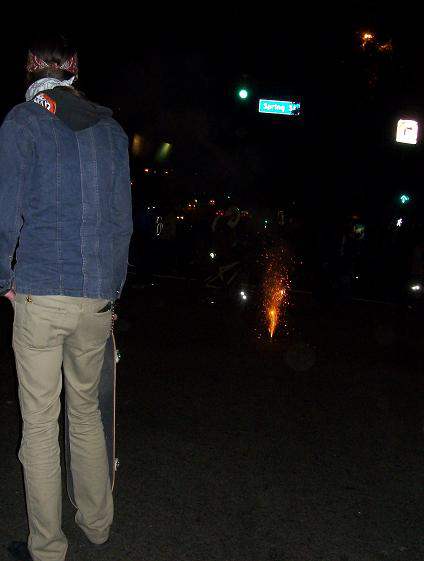
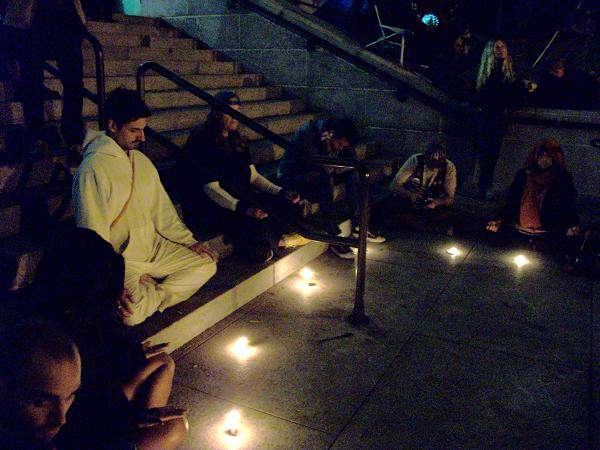
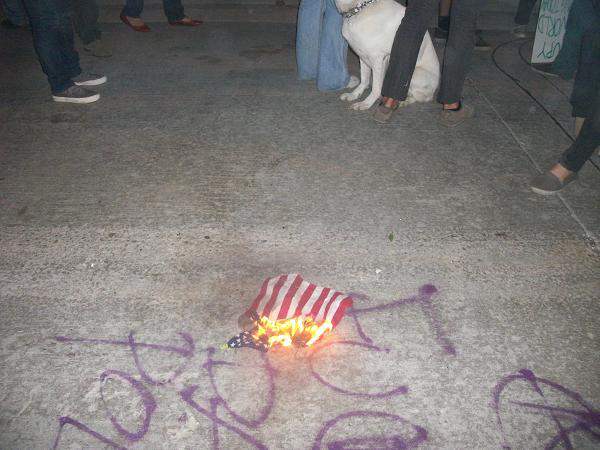
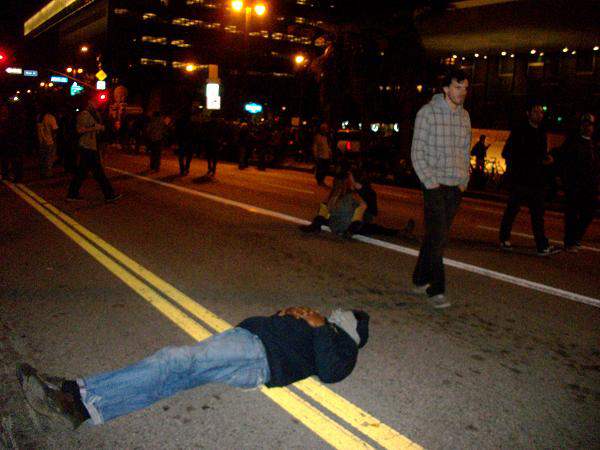
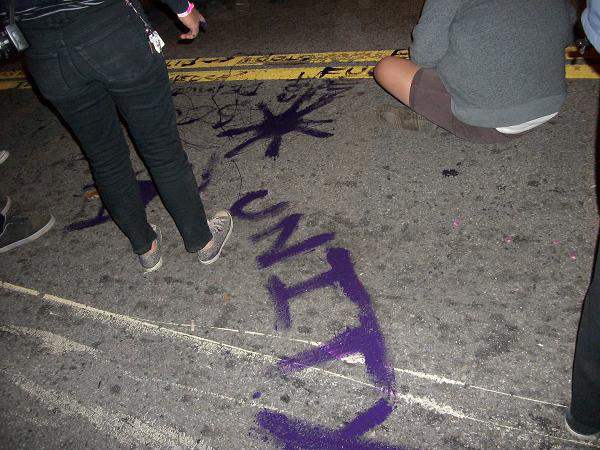
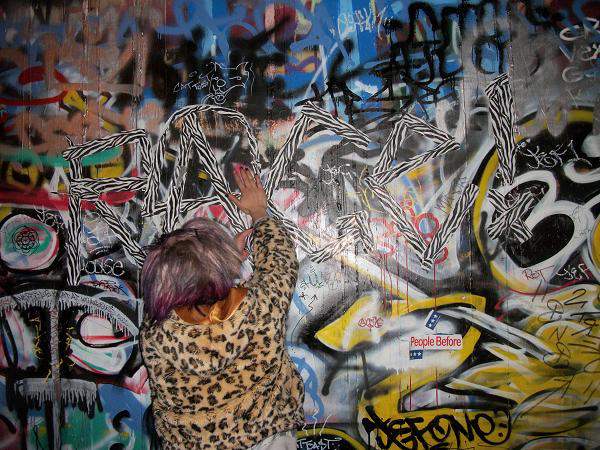
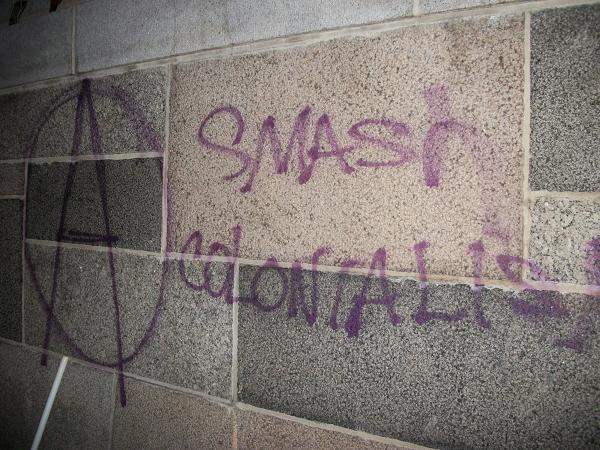
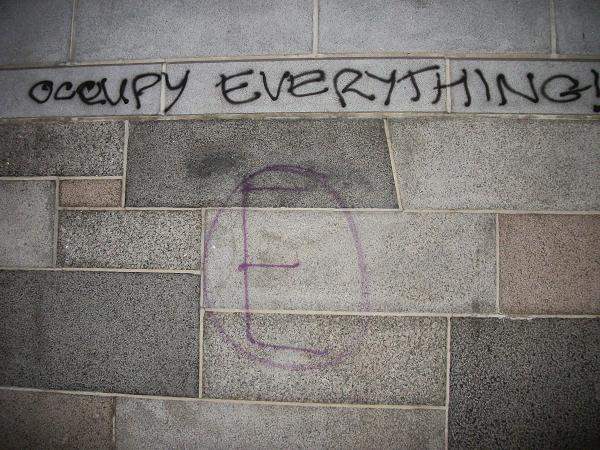
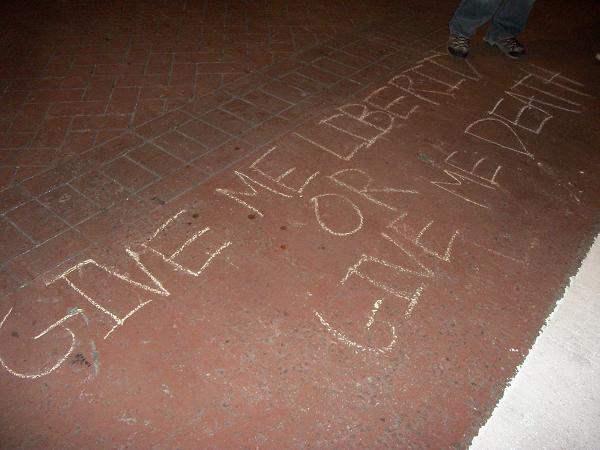
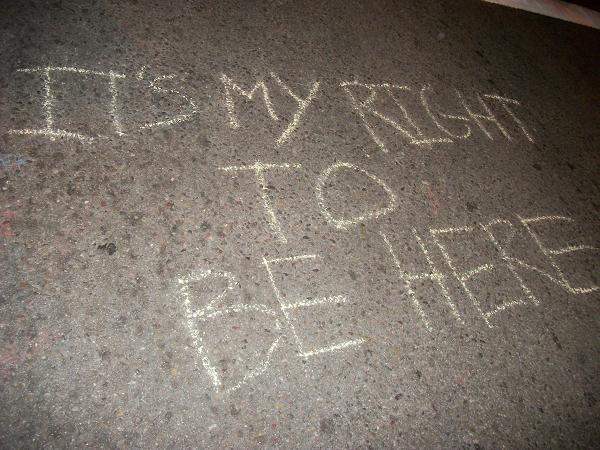
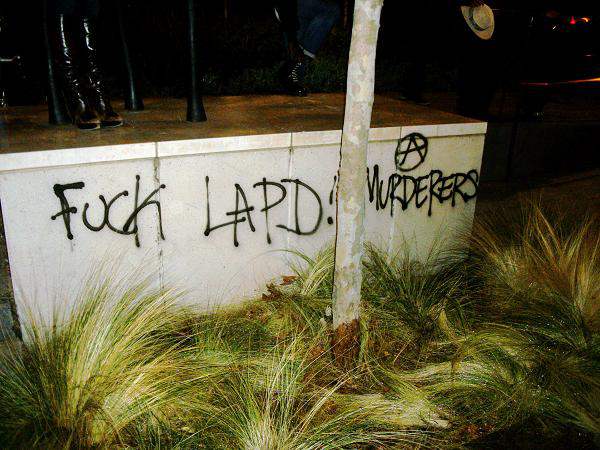
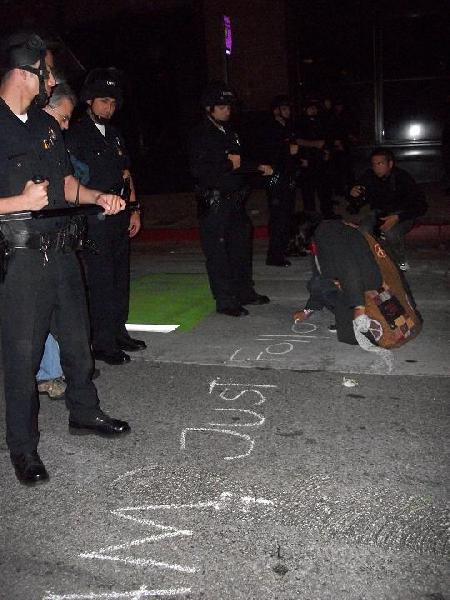
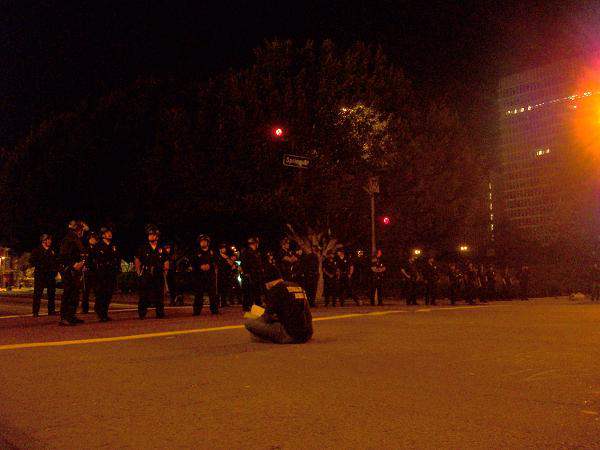
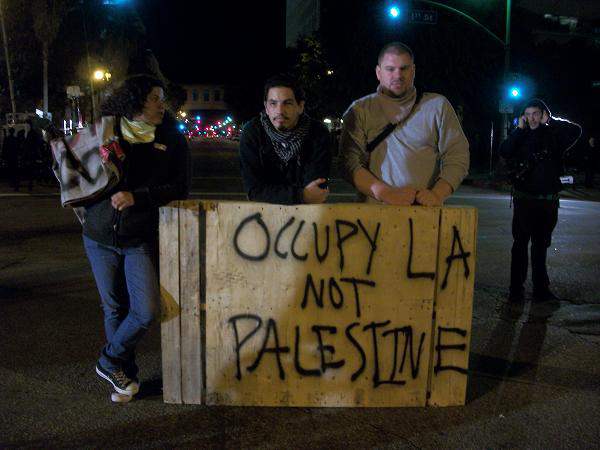
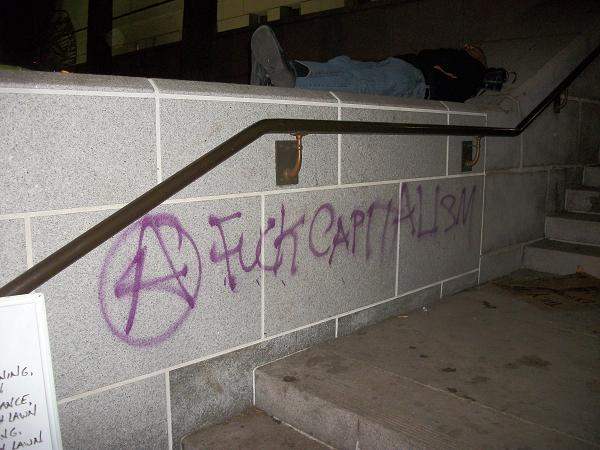
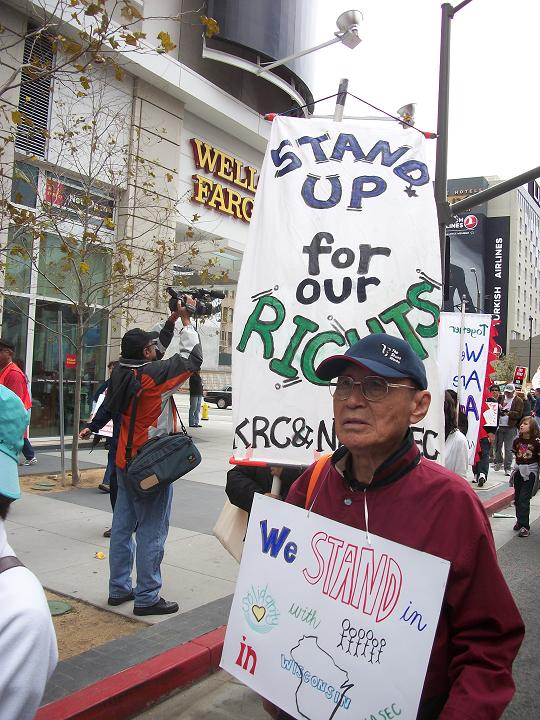
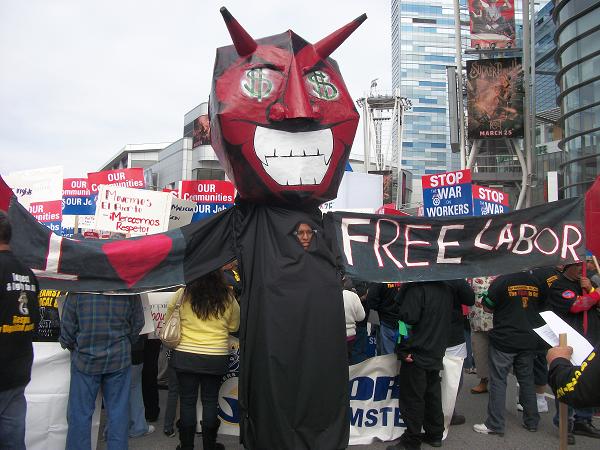
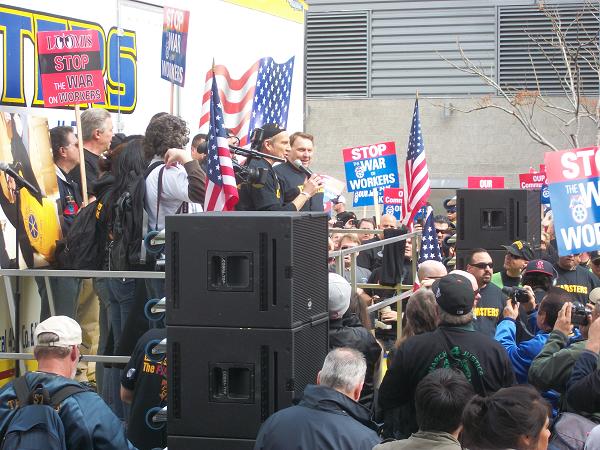
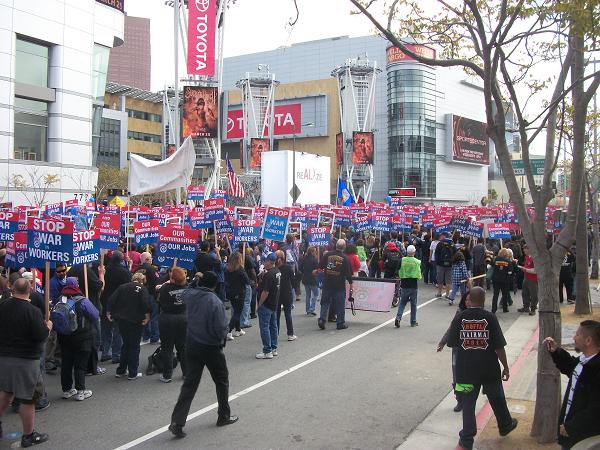
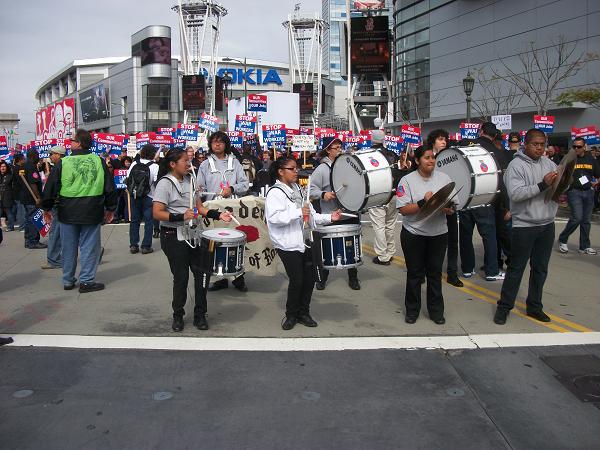
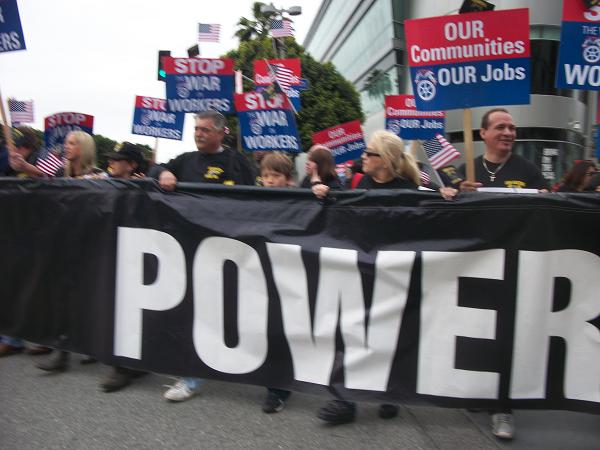
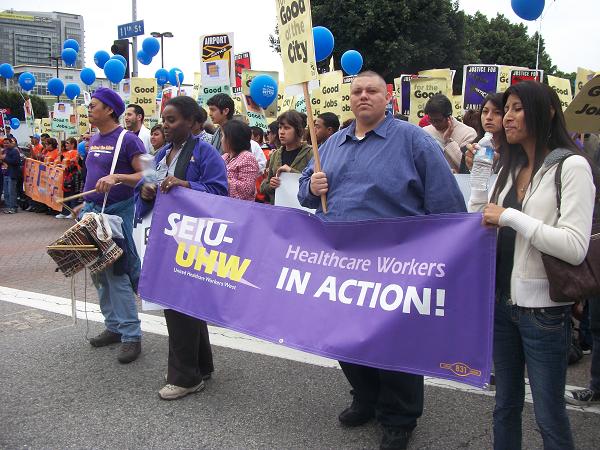
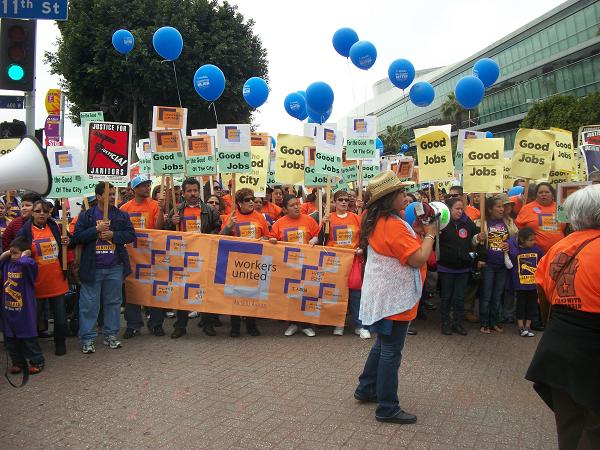
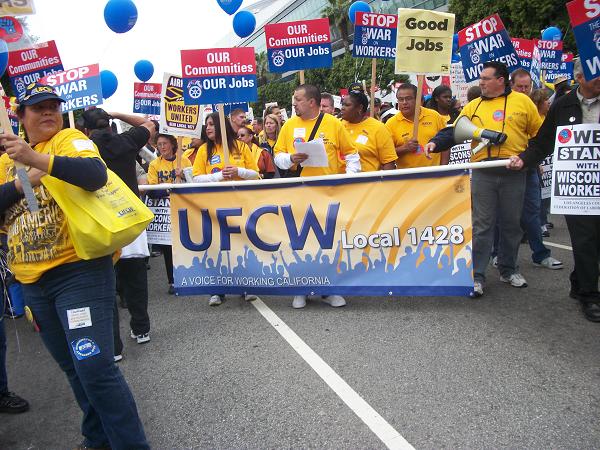
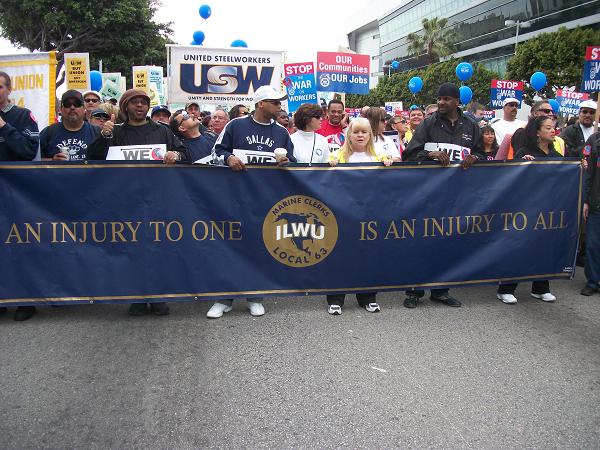
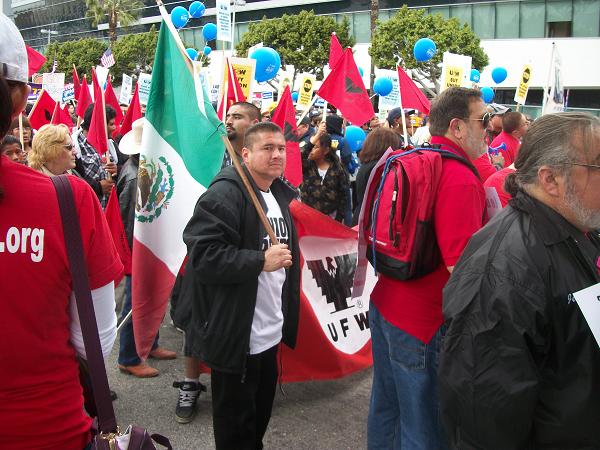
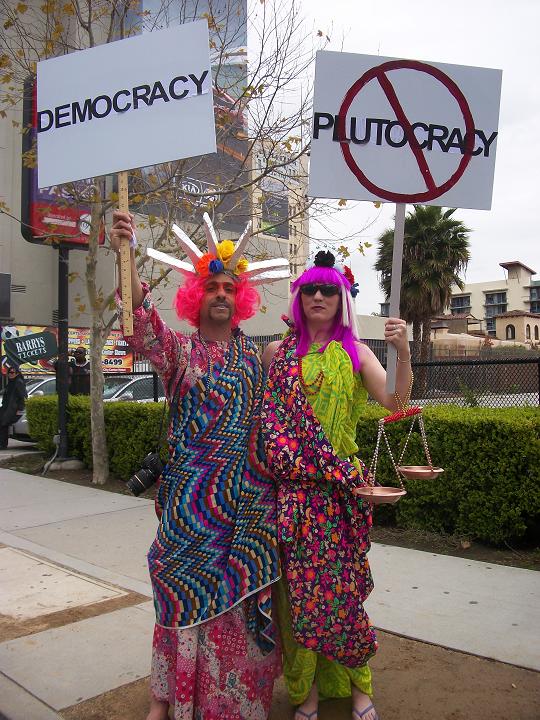
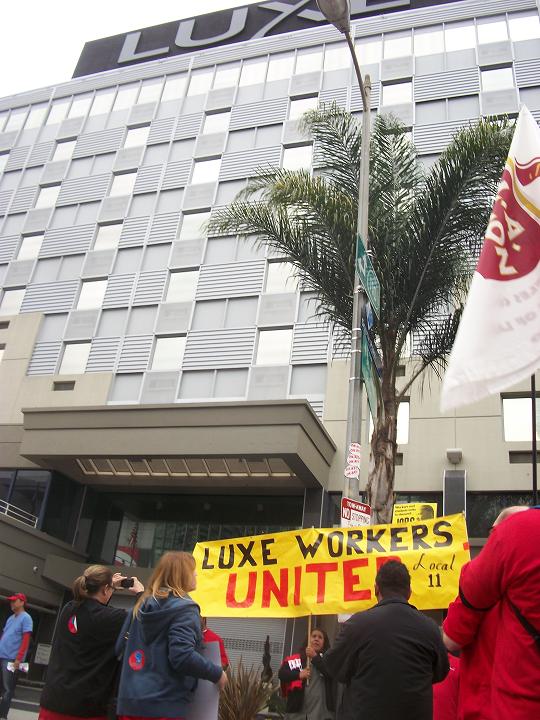
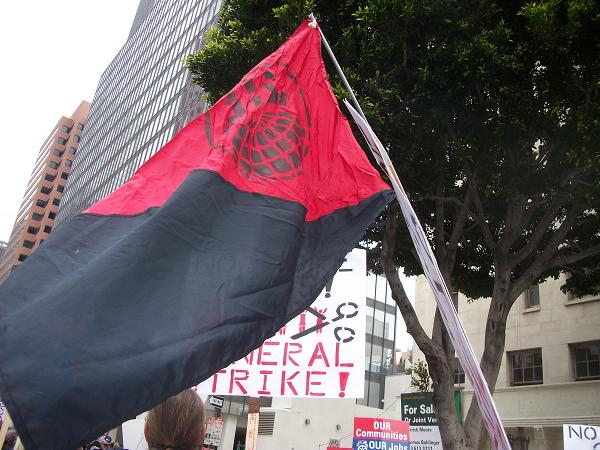
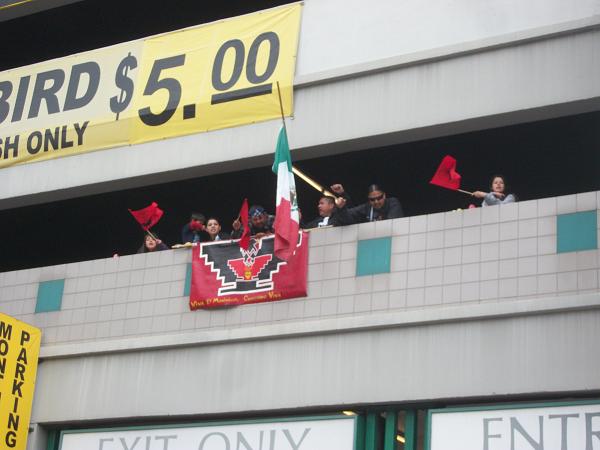
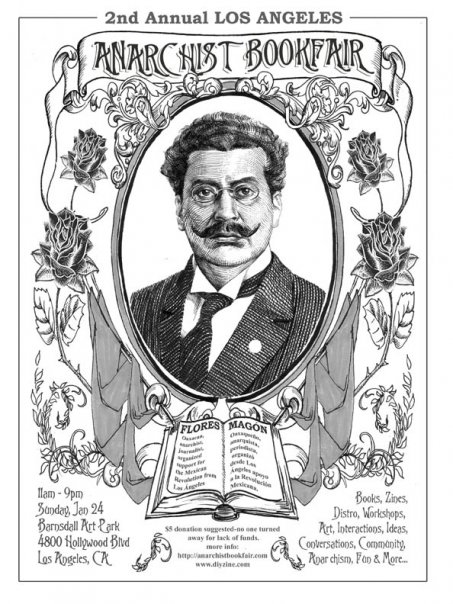

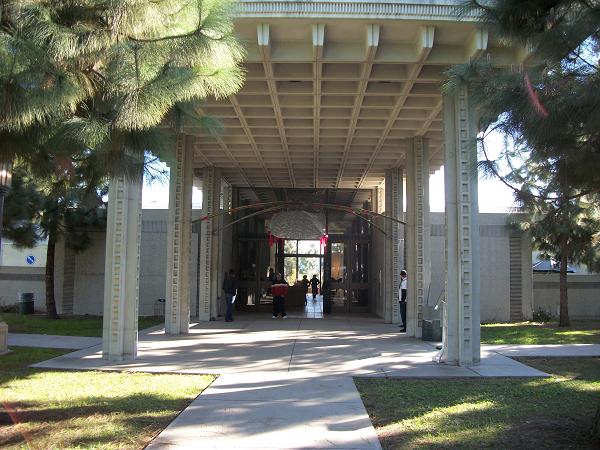
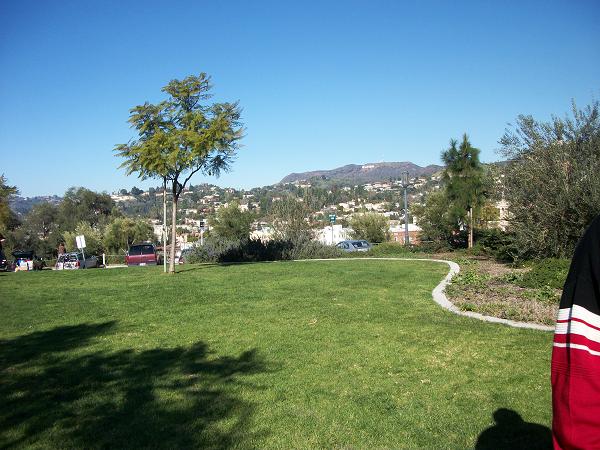
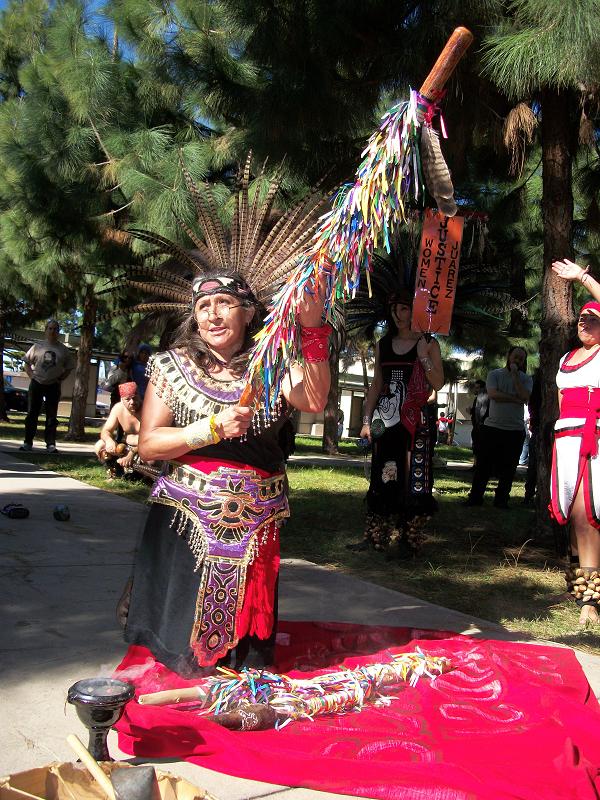
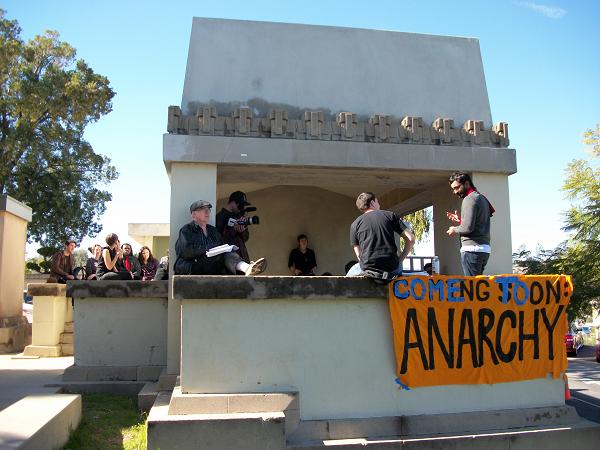
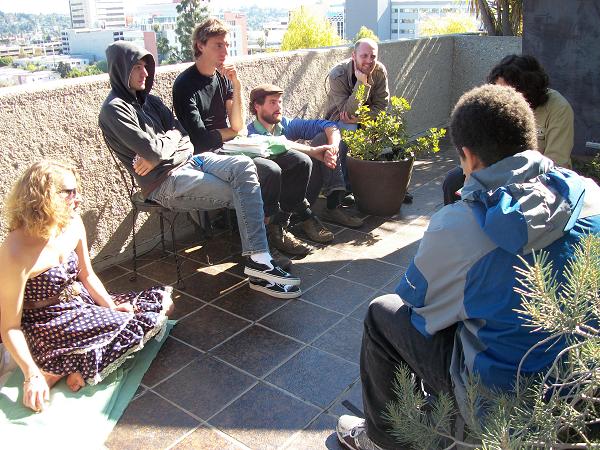
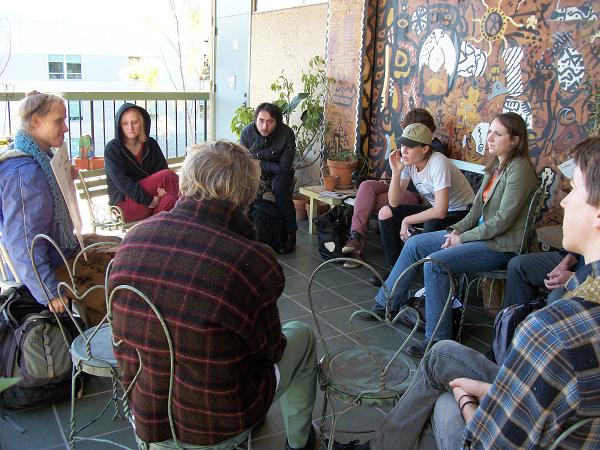
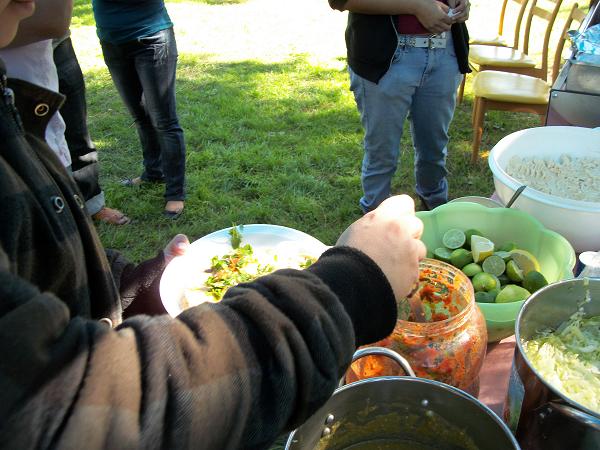
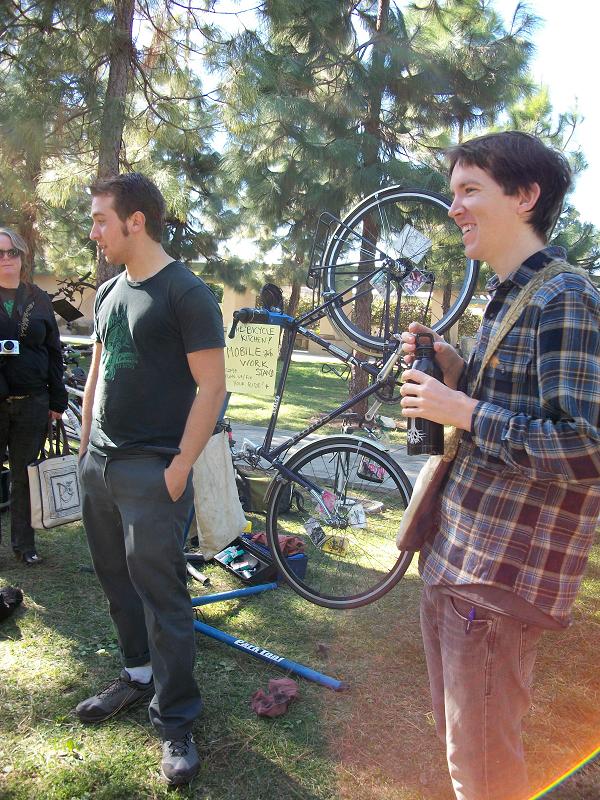
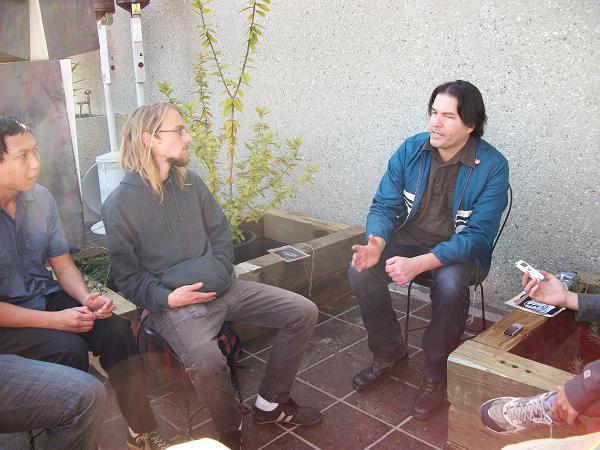
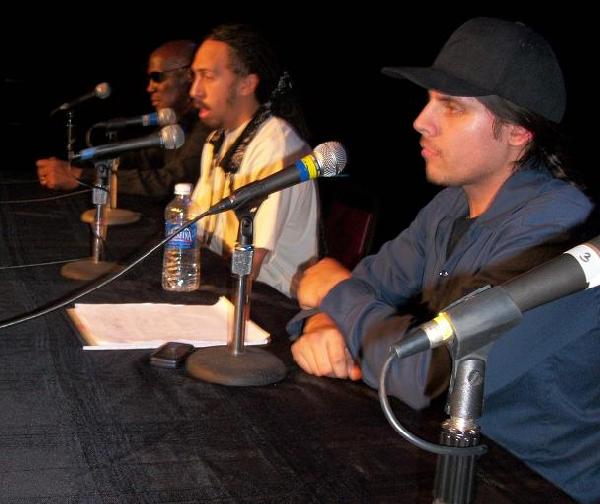
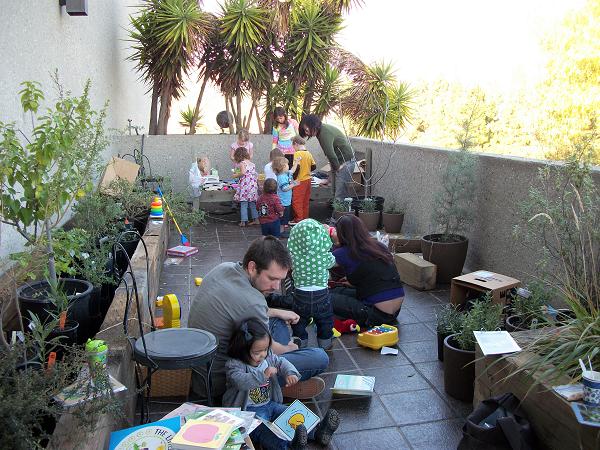
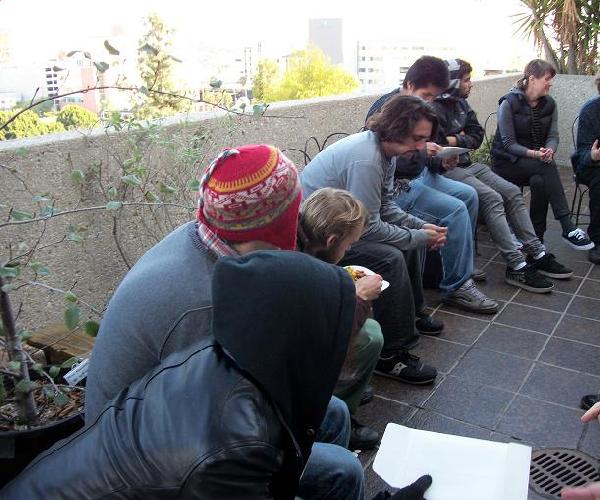
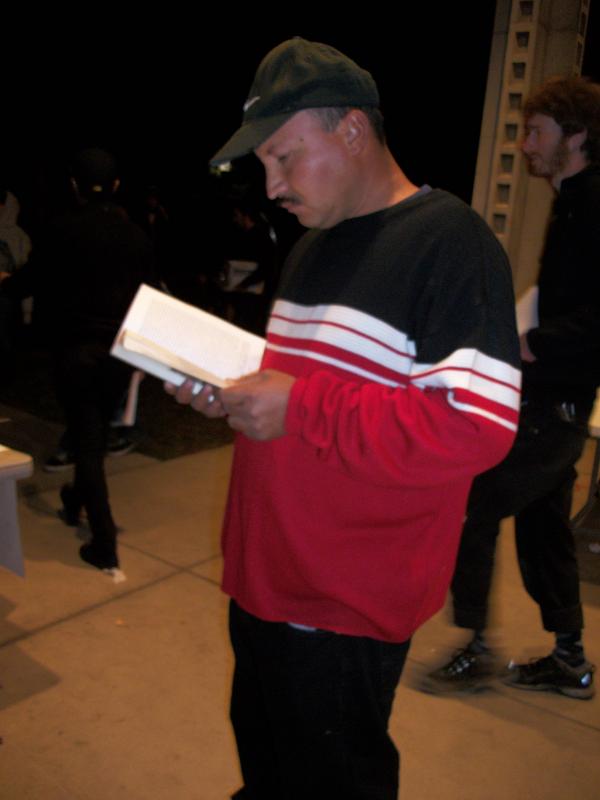
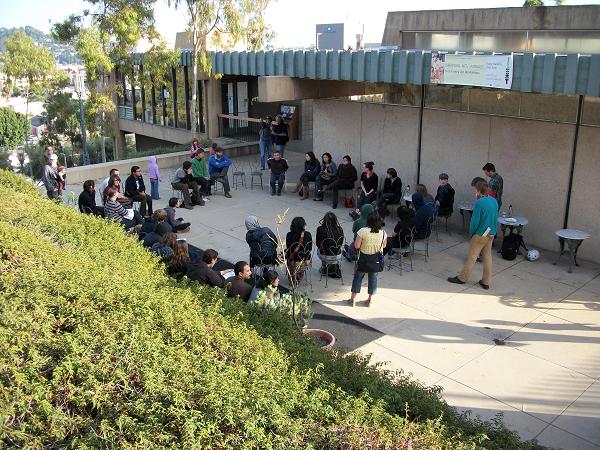
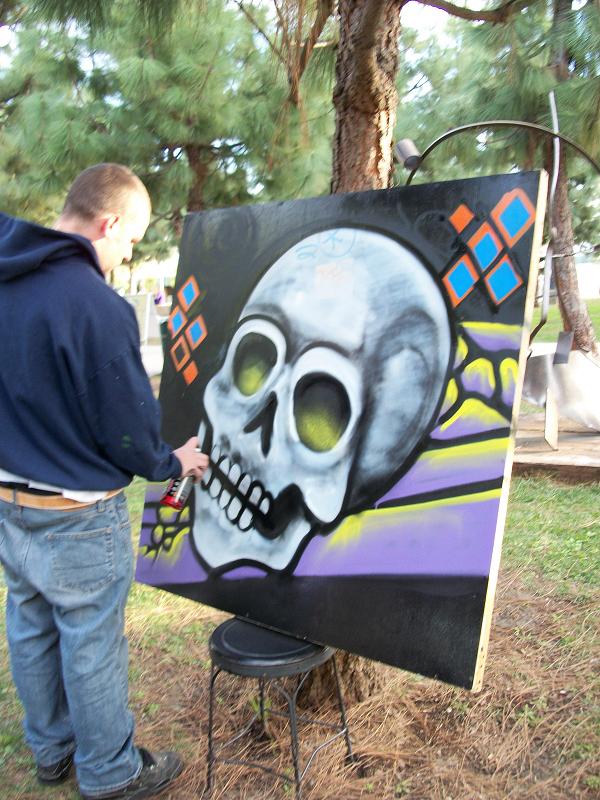
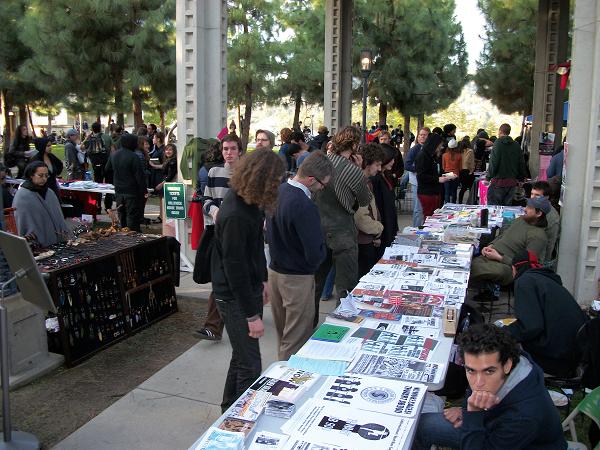
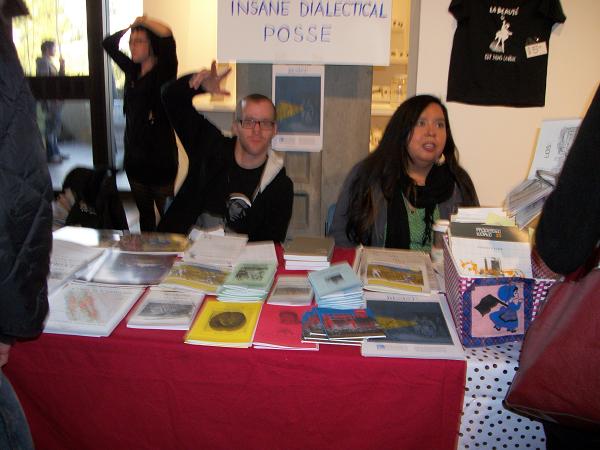
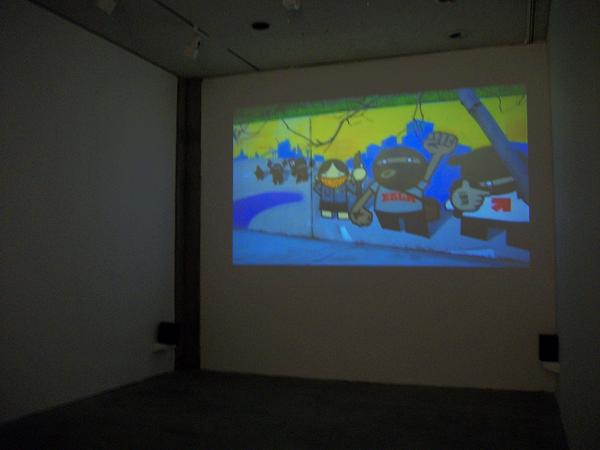
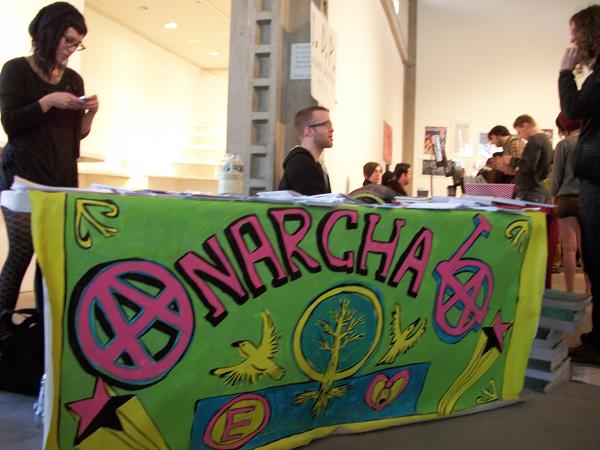
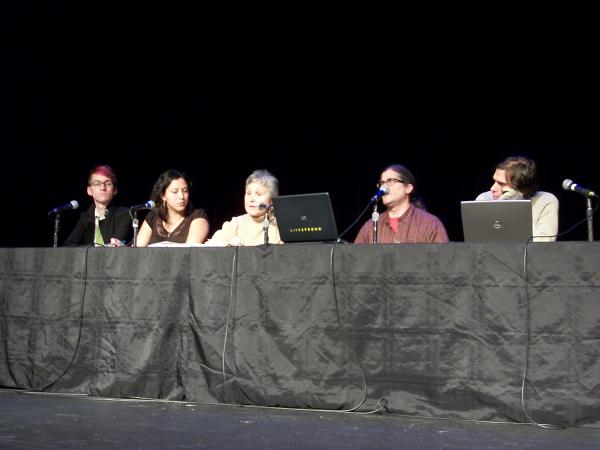 Occupations panel
Occupations panel